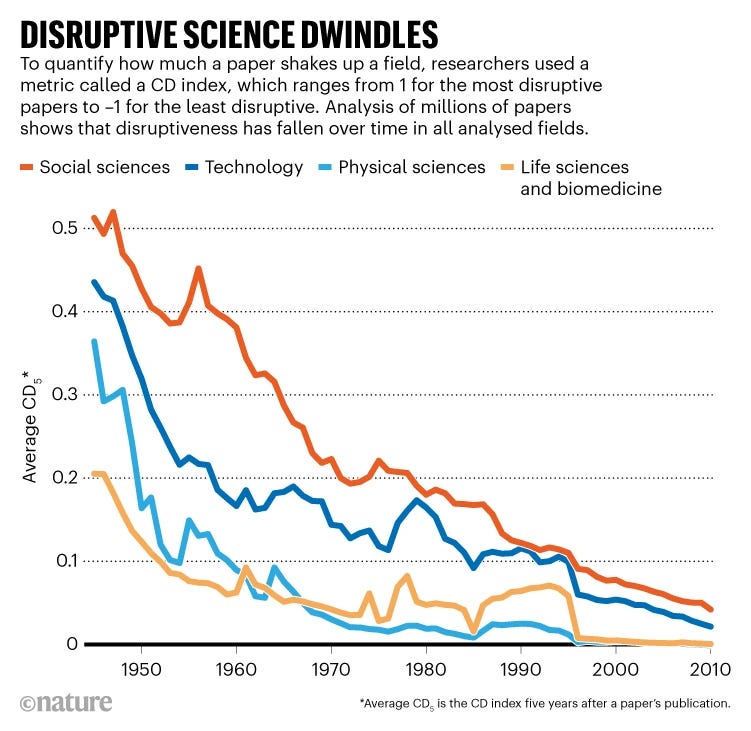Introduction
Welcome to The ContraMind Code.
The ContraMind Code provides you with a system of principles, signals, and ideas to aid you in your pursuit of excellence.
The Newsletter shares the source code, through quick snapshots, for a systems thinking approach to be the best in what you do.
The Code helps you reboot and reimagine your thinking by learning from the best and enables you to draw a blueprint on what it takes to get extraordinary things done. Please share your valuable thoughts and comments and start a conversation.
Take a journey to www.contraminds.com. Listen and watch some great minds talking to us about their journey of discovery of what went into making them craftsmen of their profession to drive peak performance.
‘Disruptive’ science has declined — and no one knows why
by Max Kozlov in Nature
Recently, Nature published this article based on a paper that analysed data from 45 million manuscripts and 3.9 million patents!
It found that the number of science and technology research papers published has skyrocketed over the past few decades — but the ‘disruptiveness’ of those papers has dropped.
It also mentions that big research teams produce incremental rather than disruptive science. So, big research teams may not produce disruptive science findings. It might be interesting to compare the period between the 1900s- 1940s and compare it with this paper, as many technological breakthroughs happened during this golden period making the US a formidable economic power in the world.
Read the article here.
Humanized Growth: A New Blueprint for Marketing
Globally, over US $1 Trillion gets invested in marketing by companies and brands.
As disruptive technologies make products and services commodities, this is the most critical time for companies to embrace marketing more than ever before. As technology lifecycles become shorter and shorter, embedding marketing as a company’s core experience will become the most significant competitive advantage.
In this conversation with Marc de Swaan Arons, Founder of the Institute of Real Growth, S. Swaminathan and Marc discuss a wide range of topics like the importance of a multi-stakeholder growth mindset for CMOs, skills required for the marketers of the future etc.
You'll be able to listen to the conversation here. Or in Apple Podcast or Google Podcast, or YouTube
Could the business of the future require no managers?
In this TED Talk, Jos de Blok, Founder of Buurtzorg, explains how he succeeded in encouraging trust while integrating simplification, which offers a great deal more for society than bureaucratic and pyramidal organisations, making daily work more meaningful and sustainable.
The Myth of Activity, Size And Measuring Its Real Impact
This week’s articles threw up a startling revelation:
Activity is not equal to Outcome.
The size of teams and quantity of research does not necessarily mean disruptive work is happening around us.
Often we hear and see people around really not having the time, running behind tight and improbable deadlines, and their calendar is filled with back-to-back meetings. In one interesting recent statistic, it was found:
Twenty-four billion hours are wasted each year as a result of unproductive meetings.
Organisations spend around 15% of their time in meetings. However, surveys show that 71% of those meetings are unproductive.
This may leave no time for planning, thinking and evaluating if the time spent was truly valuable and impactful. Hence, there is a sea of busyness around us because that’s what people associate with working hard, and there is an aura of significant contribution. It is important to relook at this and evaluate everything we do daily - recurring meetings, ongoing projects, new initiatives, projects nearing completion or ones that have been just completed etc. Often more time gets spent on ‘managing the meeting’, ‘managing the boss’, and ‘managing the group’ rather than ‘getting an outcome’.
Also, we need to be aware of the ability to balance incrementalism and disruptive outcomes. Disruptive outcomes don’t happen every day or often, but incremental improvement or outcomes can happen frequently. Long stretches of incremental improvement or outcomes may not create disruptive results or solutions. It may give a sense of movement, but over time, it may lead to a steady decline in significant and disruptive innovations. In anything we do, we must try and sandwich incremental improvements over the short term with disruptive outcomes in the medium term. There is an excellent reference to using a powerful marker for disruptive research in Nature’s article - ‘lack of citations in the paper and quoting the paper itself’ is an indicator of this. Similarly, disruptive outcomes require a lot of push and being tough on oneself to observe and evaluate if something like what is being suggested or recommended was not done before.
Therefore,
Scrapping outcome-less meetings are critical. Similarly, value-depleting managers and roles need to be abolished.
Please be sure to look continuously for disruptive jumps and incremental movements.
Some of the lessons we learnt from this week’s mission:
Disruptive research is a clear indicator of future economic prosperity. Moreover, it can apply to both nations and companies.
Marketers’ skills require rewiring to a multi-stakeholder growth leadership mindset.
Small self-managing teams are better than large-managed teams.










